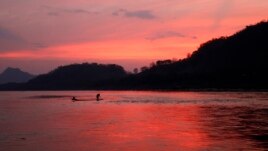20 May, 2017
Lawmakers from Asia-Pacific countries said their area is important to combating climate change during a recent international meeting in Vietnam.
Asia-Pacific members of the Inter-Parliamentary Union, or IPU, met for three days in Ho Chi Minh City to debate issues related to climate change. Their meeting ended Saturday.
The lawmakers shared their concerns about increasing worldwide temperatures and discussed ideas to combat it [climate change].

In this March 4, 2011, file photo, men ride in a boat across the Mekong River in Luang Prabang, Laos. It is officially described as the best-preserved city in Southeast Asia, a bygone seat of kings tucked into a remote river valley of Laos. Luang Prabang
"Climate change has no passport," IPU Secretary-General Martin Chungong said. "It's cross-national."
The group says cities are most responsible for climate change
The United Nations Development Program says people living in cities have a bigger impact on the environment than those who do not.
For example, Ho Chi Minh City, the site of the meeting, is home to about 10 million people. The city's Communist Party Chief, Nguyen Thien Nhan, said the city creates waste and uses water at a rate equal to 17 times the average in Vietnam.
The U.N. Development Program adds that about one billion people live in urban settings in Asia. That is more than the rest of the world combined. And it is one of the reasons that Asian lawmakers consider Asia to be important to fighting climate change.
Planting trees for change
During the IPU meeting, Nguyen Thien Nhan took the parliamentarians on a trip to the Mekong River Delta to plant mangrove trees. They also saw the effects of coastal erosion on the Delta.
Vietnam says the Mekong Delta is one of the three major river deltas most threatened by climate change.
Thai officials told VOA they plan to plant mangrove trees after they return from the Vietnam trip.
Chaiyth Promsookt said, "The most imminent threat to Thailand in terms of climate change is first, of course, deforestation and the reduction of green [areas] in Thailand." He leads the Thai National Assembly's committee on natural resources and environment.
Promsookt said the Thai government set a goal of keeping levels of forest cover to at least 40 percent over the next 20 years. Planting the mangroves will aid this goal and guard the coasts from erosion, he said.
Another action might be to persuade ethnic minorities to farm cherries and apples instead of taking part in illegal logging.
He said this would create, in his words, "a fair distribution of both income and development outcomes."
"His majesty the late king believed that this would be more inclusive in terms of development, in terms of joining the people, especially the underprivileged people in the rural areas," he said.
Those ideas are similar to suggestions of Anna Schreyoegg. She is a climate change policy and mitigation adviser at GIZ Vietnam, a German-based development agency.
Schreyoegg recommended that environmental policy should include both scientific evidence and the ideas of native groups and women.
Deforestation is also a concern for many Asian nations.
Laos has been losing trees to logging. Sanya Praseuth, the vice chair of the Laos National Assembly's economic, technology and environment committee, says this has caused temperatures to rise.
"Our country [is] getting hotter comparing with the previous" years, he told VOA.
He added that weather has become harder to predict.
Laos is trying to solve the problem by suspending logging permits.
However, some of the lawmakers said that environmental problems cannot be solved by developing countries alone.
Indonesian parliamentarian Siti Hediati Soeharto said that rich economies have a greater responsibility to reduce the production of gasses blamed for climate change.
She added that rich nations should provide aid for climate change efforts in developing nations.
"Indonesia is of the view that developed countries should continue taking the lead," she said.
I'm Phil Dierking.
This story was originally written by Lien Hoang for VOA News. Phil Dierking adapted it for VOA Learning English. Mario Ritter was the editor.
We want to hear from you. Write to us in the Comments Section or on 51VOA.COM.
_____________________________________________________________
Words in This Story
deforestation - n. the act or result of cutting down or burning all the trees in an area
erosion - n. the gradual destruction of something by natural forces such as water, wind, or ice)
indigenous - adj. produced, living, or existing naturally in a particular region or environment
imminent - adj. happening very soon
mitigation - n. to make (something) less severe, harmful, or painful
parliamentarian - n. a member of a parliament, especially one well versed in parliamentary procedure and experienced in debate.
reservoir - n. a usually artificial lake that is used to store a large supply of water for use in people's homes, in businesses, etc.